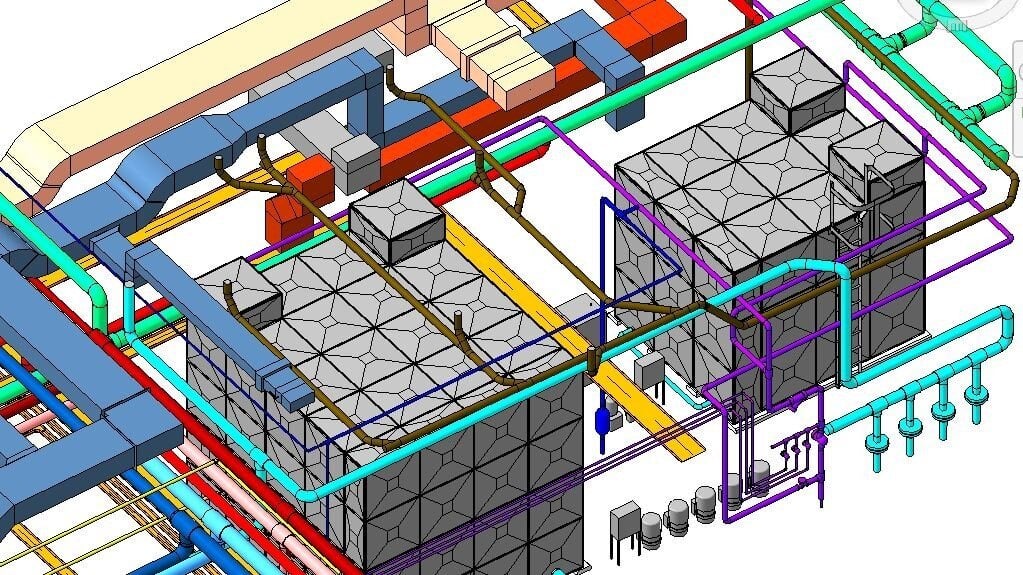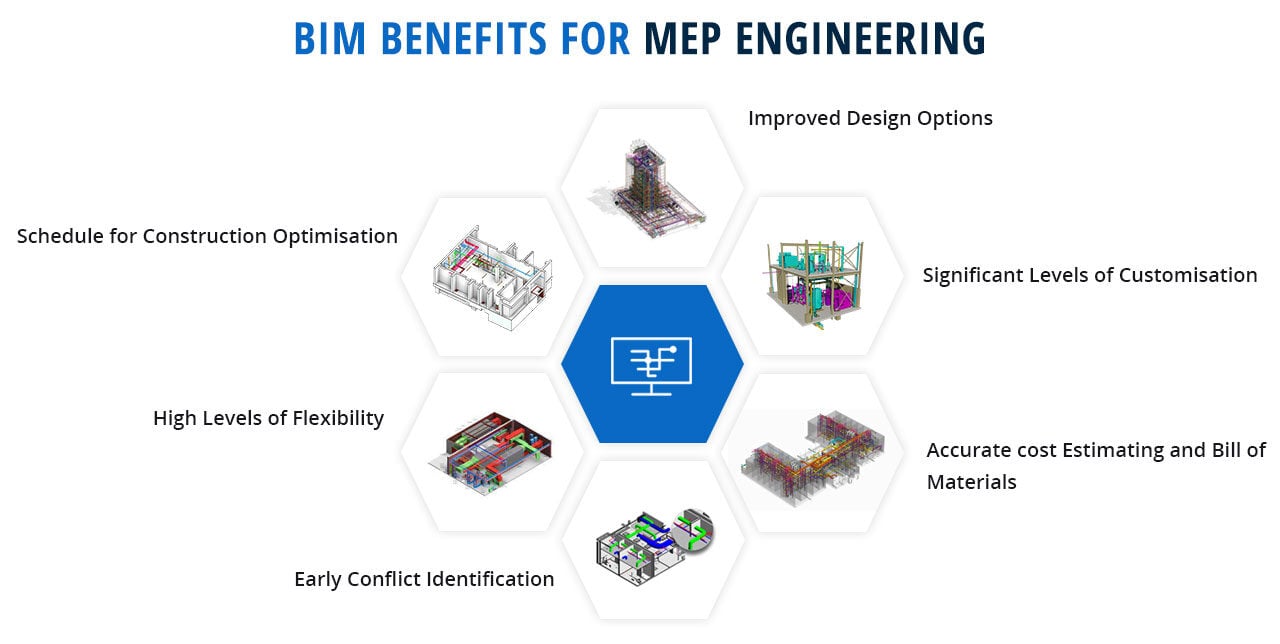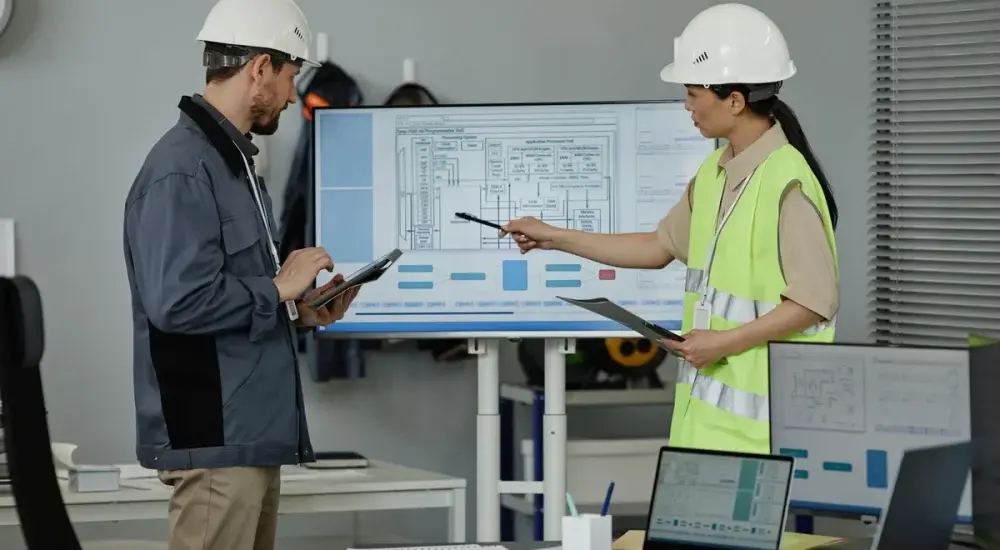
MEP (Mechanical, Electrical, and Plumbing) engineering plays a crucial role in the construction industry, focusing on the design, installation, and maintenance of essential systems within buildings. As we look toward 2025, the demand for skilled MEP engineers is expected to grow significantly due to technological advancement and an increasing emphasis on sustainable practices.
What is MEP Engineering?
MEP engineering is the science and art of planning, designing, and managing the systems of a building. It is the specialised field of engineering responsible for the planning, design, and implementation of all the essential systems within a building, including heating, ventilation, air conditioning (HVAC), electrical power distribution, lighting, plumbing, and fire protection.
Essential Skills for an MEP Engineer
To excel as an MEP (Mechanical, Electrical, and Plumbing) engineer, professionals require a mix of technical expertise and interpersonal abilities. Here's a breakdown of key skills:

1. Communication
Strong communication skills are vital for MEP engineers as they frequently interact with diverse stakeholders, including clients, project managers, MEP technicians, and vendors. Clear verbal and written communication enables effective collaboration, seamless information exchange, and quick problem resolution.
2. Teamwork
Working on HVAC, electrical, and plumbing systems involves close coordination with project teams and service providers. Effective teamwork fosters productive relationships and ensures everyone aligns toward shared project objectives.
3. Analytical Thinking
Critical thinking is essential for evaluating MEP designs, identifying potential flaws, and ensuring compliance with site requirements, client needs, and regulations. MEP engineers also rely on analytical skills to monitor installation progress and address issues proactively.
4. Mathematical Expertise
Proficiency in mathematics—including geometry, algebra, calculus, and trigonometry—supports accurate system design and troubleshooting. These skills also aid in budgeting and time management for projects.
5. MEP System Proficiency
An in-depth understanding of MEP systems is crucial. This includes expertise in HVAC components like air distribution and renewable energy systems, electrical systems such as power distribution, and plumbing knowledge for water systems, storm drains, and gas piping.
6. Software Skills
MEP engineers often use tools like AutoCAD, Revit MEP software, MATLAB, and Simulink to create precise system designs and models. Proficiency in these applications streamlines design, accelerates project timelines, and simplifies adjustments.
By mastering these skills, MEP engineers can deliver efficient, compliant, and innovative solutions for construction projects.
What are the Qualifications for MEP Engineers?
Education: A bachelor’s degree in mechanical or electrical engineering is essential. Pursuing a master’s degree or an MBA can boost career prospects.
Certifications:
- MEP Engineer Course for foundational skills.
- PE Certification after five years of experience.
- IntPE Certification after seven years of global recognition.
Software Skills: Expertise in tools like AutoCAD, Revit, MATLAB, and Simulink enhances design and modeling efficiency.
Professional Membership: Joining the Engineering Council of India ensures skill updates, ethical compliance, and professional development.
What are the Certifications and Licenses for Engineers?
Engineers with a Bachelor's degree can take the Fundamentals of Engineering (FE) exam to become MEP Engineer in Training (EIT). Graduates from ABET-accredited programs can qualify for the Professional Engineer (PE) exam after four years of supervised experience; others must wait eight years. The PE license is the highest credential, allowing engineers to approve and seal designs, with CEUs required for maintenance.
Plumbing designers should consider the Certified Plumbing Designer (CPD) certification, which is widely recognised but not universally held. CEUs are also necessary for this certification. MEP engineers can pursue LEED Professional certification for expertise in sustainable design and the WELL Accredited Professional (WELL AP) credential for health-focused building design.
These certifications enhance credibility and career opportunities in engineering.
What are the Primary Duties, Roles & Responsibilities of an MEP Engineer?
MEP (Mechanical, Electrical, and Plumbing) engineers are critical to designing, installing, and maintaining essential building systems. Their role combines technical expertise, project management, and teamwork to ensure seamless operation.
Key Responsibilities

Managing Projects
MEP engineers oversee projects from start to finish. They plan schedules, manage budgets, and ensure tasks are completed on time while meeting industry standards and regulations.
Designing and Planning Systems
They create detailed designs for HVAC systems, plumbing, and electrical layouts. This involves load calculations, feasibility studies, and selecting suitable equipment to optimize system performance.
Providing Technical Oversight
During installation and maintenance, MEP engineer offers technical guidance, troubleshoot problems, and ensure systems function efficiently.
Ensuring Compliance and Safety
They ensure all systems comply with building codes, health, and safety regulations. Coordination with approval authorities and addressing compliance issues are key parts of their job.
Collaboration with Teams
MEP engineers work closely with architects, structural engineers, and contractors to integrate MEP systems into building designs. They also resolve conflicts between systems for a cohesive outcome.
Documentation and Reporting
Keeping accurate records is vital. MEP engineers prepare construction drawings, specifications, and technical documents while tracking any design changes or updates.
In addition to these core duties, MEP engineers often handle additional responsibilities based on the project’s needs, making them indispensable to construction and design projects.
The Growing Scope of MEP Engineering in 2025
MEP engineering is a key component in every construction project, ensuring that a building's mechanical, electrical, and plumbing systems work efficiently alongside the civil infrastructure. It's become a sought-after career path for those with a background in mechanical or electrical engineering in India, with steady demand across all stages of a project. The field also offers great potential for 3-year diploma holders, particularly when paired with relevant certifications. ASHRAE (American Society of Heating, Refrigerating, and Air-Conditioning Engineers) offers recognized certifications that open doors to excellent job opportunities and competitive salaries.
Globally, MEP engineers are in high demand, especially in the Gulf region. Countries like the UAE, Saudi Arabia, Oman, Kuwait, and Qatar are experiencing rapid development with large-scale projects such as airports, hospitals, schools, and malls, all of which rely heavily on sophisticated MEP systems, including centralized air conditioning.
With its wide-ranging career opportunities and international demand, MEP engineering continues to be a promising and rewarding field for professionals looking to make their mark.
What are the Career Opportunities in Revit MEP?
Mastering Revit MEP course opens various career paths in the construction and engineering industries:

MEP Design Engineer: Design HVAC, electrical, and plumbing systems using Revit MEP for accurate, detailed plans.
BIM Specialist: Create 3D models that integrate MEP systems with overall building designs, improving efficiency.
MEP Coordinator: Ensure smooth integration of MEP systems by coordinating with architects and contractors using Revit.
Revit MEP Trainer: Teach others how to use Revit MEP effectively in educational institutions or corporate training.
MEP Draftsman: Create technical drawings of MEP systems from conceptual designs.
Project Manager: Oversee MEP projects, utilizing Revit MEP course for design and coordination.
Revit MEP expertise significantly boosts career prospects in these growing fields.
Work Environment of an MEP Engineer
The work environment of an MEP engineer can vary based on the type of project they're working on. Typically, MEP engineers split their time between office work and on-site inspections.
In the office, they spend a good portion of their day working at a desk, using software to design and plan mechanical, electrical, and plumbing systems. They focus on creating detailed layouts and plans that align with project requirements.
However, their role also takes them to construction sites. On-site visits allow MEP engineers to inspect the installation of systems like HVAC, electrical, and plumbing. These inspections help them stay informed about the project's progress and identify any issues or potential challenges early on.
Additionally, MEP engineers may visit product vendors and manufacturers to review, inspect, and order the materials needed for their projects.
Although they typically work 40 hours per week, MEP engineers may put in extra hours if the project demands it. Their role requires frequent collaboration with other engineers, project managers, contractors, and construction teams to ensure everything runs smoothly and meets the desired standards.
MEP Engineer Salary and Career Paths
MEP engineers can earn impressive salaries, often exceeding $100,000 to $200,000 annually, depending on their role and level of experience. Factors such as education, certifications, licenses, and skill set play a significant role in determining salary levels.
Career Path in MEP Engineering
The career path in MEP engineering is diverse and offers opportunities to suit different goals and aspirations. Here's a breakdown of possible career advancements:
Principal Engineer or Partner
For those aiming for senior positions like Principal Engineer or Partner, the journey requires mastering a broad range of skills. This role demands expertise in MEP engineering, the ability to analysze financial data, lead business development efforts, and become a strategic partner in HR functions. Expect longer hours and greater responsibilities but with the benefit of higher salaries and enhanced fringe benefits.
Project Manager (PM)
Project Managers play a critical role in overseeing the design, budget, and execution of MEP projects. For those interested in this path, obtaining a Project Management Professional (PMP) certification is highly recommended. This certification equips PMs with valuable knowledge about the financial side of MEP firms, an area where many major decisions are made.
MEP Design Engineer
Many engineers are drawn to roles focused on MEP design. These engineers are often the backbone of engineering teams, and their expertise in creating efficient, functional systems is always in high demand. Many engineers find satisfaction and stability in this role, making it a fulfilling career choice for those who prefer specialiszed design work.
Commissioning and Construction Administration
Engineers in commissioning ensure that MEP systems are performing optimally, providing services aimed at enhancing building efficiency. Similarly, construction administration focuses on managing the MEP design during the construction phase. Both paths offer unique opportunities to support clients in achieving superior building performance.
In MEP engineering, there’s a wide variety of career paths, each offering its challenges and rewards. Whether you’re aiming for leadership positions, focused on project management, or prefer technical design, the field has opportunities for growth and advancement at every level.
Choose Novatr’s BIM Professional Program for MEP Engineers

Novatr’s BIM Professional Program for MEP Engineers offers a comprehensive, expert-led curriculum that combines hands-on learning with flexible study options. Whether you’re just starting in MEP engineering or looking to enhance your existing knowledge, this MEP course provides the technical expertise, industry insights, and career support you need to excel.
Course Details:
Fees: INR 1,95,000
Duration: 7 Months
Designed to prepare you for high-demand roles in modern construction projects, this program equips you with the skills necessary to succeed in the fast-evolving MEP industry.
Ready to advance your MEP career? Enroll in Novatr’s BIM Professional MEP course today and take the first step towards becoming a skilled and in-demand MEP engineer!
If you’re committed to making your mark in MEP (Mechanical, Electrical, and Plumbing) engineering, Novatr’s BIM for MEP Engineers is the perfect foundation to master the technical skills and knowledge needed to succeed in this dynamic field.
Conclusion
MEP engineering plays a vital role in shaping our built environment. By mastering essential skills like communication, teamwork, and technical expertise, you can embark on a rewarding career. The demand for skilled MEP engineers is on the rise, driven by technological advancements and a growing focus on sustainability. With continuous learning and a commitment to excellence, you can thrive in this dynamic field.
Whether you're drawn to design, project management, or leadership roles, the opportunities are vast. Consider pursuing a comprehensive program like Novatr's BIM Professional Course for MEP Engineers to equip yourself with the knowledge and skills necessary to excel as an MEP engineer in today's competitive market.
This conclusion emphasizes the importance of human skills alongside technical expertise, highlights the growing demand for MEP professionals, and encourages readers to take proactive steps toward building a successful career in this field.
Frequently Asked Questions
1. What is the salary of a MEP engineer?
The estimated total pay for a MEP engineer is around ₹31,667 per month, with an average salary of ₹30,000 per month. These figures represent the median earnings in this profession.
2. What is the full form of MEP?
MEP stands for Mechanical, Electrical, and Plumbing.
3. Is MEP engineering a good career?
Yes, MEP engineering is considered a promising career choice due to:
1) High demand in the construction industry.
2) A stable MEP engineer job market with competitive salaries.
3) Opportunities to work on diverse projects.
4) Growing focus on green building technologies, making it a lucrative field for skilled engineers.
4. What is an MEP team?
An MEP team typically includes:
1) A Principal Licensed Professional Engineer, responsible for acquiring MEP projects.
2) A Project Manager, licensed as a mechanical or electrical engineer, who ensures proper project execution and budget management.
3) Mid-level and Senior Engineers (Licensed PEs), EITs (Engineers in Training), and designers who handle design tasks.
4) Entry-level engineers, who work under the guidance of experienced professionals.
5. What are the different types of MEP engineering professions?
The key disciplines within MEP engineering are:
1) Civil Engineering: Focuses on infrastructure like roads, bridges, and tunnels.
2) Electrical Engineering: Specialises in designing electrical systems for buildings and structures.
3) Mechanical Engineering: Involves HVAC systems and other mechanical aspects of construction.
4) Plumbing Engineering: Concentrates on water supply, drainage, and plumbing systems.
Was this content helpful to you







